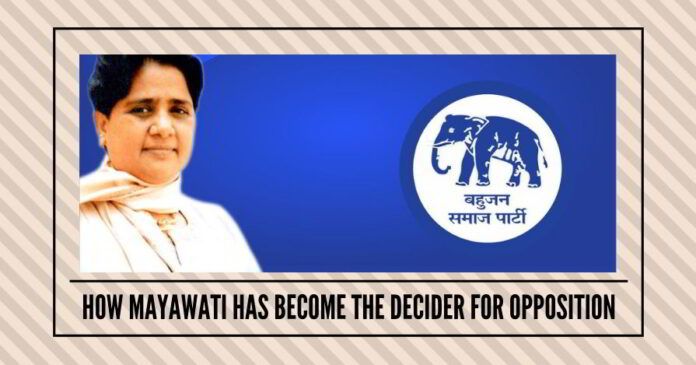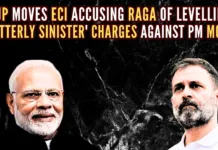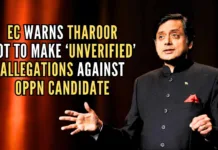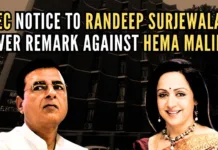
Mayawati has repeatedly said that her party would be a partner in the larger anti-Modi combine provided it got a respectable number of seats to contest as its share.
Well before the 2019 Lok Sabha election and just ahead of Assembly elections to the three politically important States of Rajasthan, Madhya Pradesh, and Chhattisgarh, Bahujan Samaj Party (BSP) chief Mayawati has pulled a fast one on the Congress. She has tied up with the Congress’s rival in Chhattisgarh, Ajit Jogi’s Janata Congress Chhattisgarh (JCC), and announced nearly two dozen of her party’s candidates in Madhya Pradesh, for Assembly polls in the two States. In both instances, she shattered aspirations which the Congress had been nurturing, of getting her support as part of the drive to defeat the Bharatiya Janata Party. The Congress, having realized the futility of convincing her on Chhattisgarh, believes that all is not lost yet with regard to Madhya Pradesh.
The BSP is said to have played a stellar role in swinging crucial votes in the favor of the anti-Modi combine.
Mayawati’s decisions have delivered a few unmissable messages. First, she refuses to blindly march to the anti-Modi drumbeats of a disparate group of band-players, even as she remains as strenuously against Modi as the rest. Second, she places her party’s interests above that of the so-called collective resolve to oust the Modi/ Amit Shah-led BJP. And third, she will not hesitate to rock the opposition unity boat — now or later — in case her ego is not adequately taken care of.
She has repeatedly said that her party would be a partner in the larger anti-Modi combine provided it got a respectable number of seats to contest as its share. Mayawati knows that the higher the number of seats the BSP gets to fight (and win), the greater will be her leverage in a post-poll situation. In Uttar Pradesh, for instance, while Samajwadi Party leader Akhilesh Yadav has been bending over backwards to entice her into a SP-BSP alliance for 2019 — and assuring that he was willing to be as accommodative the occasion demanded, to have Mayawati on board — the BSP supremo has demonstrated no such magnanimity. Her level of support is directly proportional to the number of seats the BSP will get to contest in case of a joint anti-BJP coalition materializing and is less proportional to the possibility of such a ‘grand alliance’ gaining victory over the Modi-helmed party.
Staying with the Uttar Pradesh example, it may sound amazing that the BSP, which ended up with zero seats in the last Lok Sabha election and finished a distant and poor third in the 2017 Assembly election, should be so assiduously courted today. The change of heart in the Congress and the SP camps came after Mayawati extended her support to a joint opposition’s candidates in a clutch of recent by-elections to the Lok Sabha from the State — where the BJP had to face defeat. The BSP is said to have played a stellar role in swinging crucial votes in the favor of the anti-Modi combine. The win raised Mayawati’s stock, but it also re-ignited the BSP leader’s ambitions that had gone dormant following a string of earlier defeats. While there may be two opinions on whether a SP-BSP combine can successfully take on the BJP in the Lok Sabha seats from Uttar Pradesh, there is no dispute that the two parties will face defeat in case they contest separately and against each other, apart from also fighting the BJP.
Mayawati hopes to leverage her aggression to persuade the Congress leadership, both at the State and the high command levels, to accord her that ‘respectable’ share.
Mayawati is eager to redeem her lost prestige, but she will do so only on her terms; she has, after all, nothing more to lose after the wipeout in 2014. On the other hand, the Samajwadi Party has to grapple with a fresh problem, which is the challenge by the renegade, Shivpal Yadav, who has floated his own party and is determined to steal traditional SP votes. It’s unclear whether he will be able to make a decent dent even, but Akhilesh Yadav cannot take chances — which is why he is keen to tie up with Mayawati. That may possibly happen in Uttar Pradesh, but it will not resolve the Congress’s problems.
And so we return to Chhattisgarh. Under the arrangement, the BSP will contest 35 Assembly seats while the JCC will fight from 55 seats. This is a good deal for both; Ajit Jogi gets a shot at damaging the Congress, which in his view has humiliated him. Together with the BSP, he can at the very least harm the Congress’s prospects to the extent that it gives the BJP an edge. The BSP has every reason to treat the 35 seats it has secured to contest, as a bonanza in a State where it has just one MLA. There is no way it would have got this number, had it aligned with the Congress. All said, the Congress should feel doubly snubbed, because Mayawati chose to partner with a feisty opponent of the grand old party, an opponent who till the other day was the Congress’s face in Chhattisgarh.
If Mayawati struck hard at the Congress in Chhattisgarh, she has embarrassed the party in Madhya Pradesh, where the Congress is engaged in a direct fight with the BJP. The BSP had made it known earlier that it would be open to an alliance with anti-Modi forces provided her party got ‘respectable’ number of seats as its share in States where it has a grassroots presence, if not enough seats; Madhya Pradesh is one among them. Her declaration of BSP candidates in some two dozen seats is clearly a pressure tactic directed at the Congress. Mayawati hopes to leverage her aggression to persuade the Congress leadership, both at the State and the high command levels, to accord her that ‘respectable’ share.
These developments have led to uncertainty over the larger national opposition scenario. Mayawati holds the key; unlike her, other regional satraps such as Mamata Banerjee, Chandrababu Naidu or MK Stalin, do not have any influence outside of their respective States. To reiterate, it’s ironical that a party and its leader who had been wiped out in two subsequent elections — 2014 and 2017 — should be the decider today.
Note:
1. The views expressed here are those of the author and do not necessarily represent or reflect the views of PGurus.











Akhilesh Yadav and Congress are both very desperate for survival in UP. Mayawati is an extremely cunning politician. In the end, she will offer SP -5, Congress 2 and other small 3 seats to contest as Maha Gath Bhandhan. She will demand to contest 70 seats in UP Locksabha 2019 election. This will be her respectable figure. She will take advantage because two pappus are clowns and cannot handle premier league of politics.
This looks a fair deal. But she may ultimately agree for somewhere around 60 seats.
Anilbhai, Akhilesh Yadav will destroy Samajwadi Party like Congress if he does Gathbandhan with BSP. Bua will swallow SP vote bank in future. The temporary little gain will give him permanent pain. Bahenji will be the only one to challenge Modiji and Yogiji maybe 10-15 years later.
They say- a specialist is one who knows one subject and generalist is one who knows nothing. Likewise AY, CBN, MB are only state leaders, since they rule only one state, but Mayawati- which rules none ( in fact- not even second) is a national leader.
Do you say that BJP will loose?